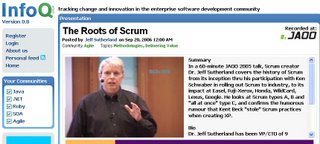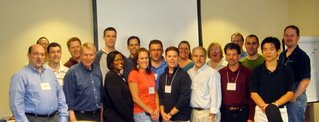CSM Training in Boston
21-22 September 2006
Jeff Sutherland started the first Scrum at Easel Corporation in 1993. He worked with Ken Schwaber to emerge Scrum as a formal process at OOPSLA'95. Together, they extended and enhanced Scrum at many software companies and IT organizations and helped write the Agile Manifesto.
The course was given at Jeff's company, PatientKeeper, which is well known as a laboratory for Scrum research. He will be assisted by the PatientKeeper Product Owner who will go through Product Backlog management for a complex product portfolio and will describe how to automate and manage Sprint Backlogs for multiple teams developing a wide variety of integrated and interoperable products.
Jeff is an expert on distributed/outsourced Scrum (see his paper on the SirsiDynix project) and on implementing Scrum in a CMMI Level 5 company (see recent submission to CMMI conference). He has also done research and development on Scrum using his last five companies as laboratories. His entire current company at PatientKeeper is run by a MetaScrum, and is one of the most advance implementions of Scrum worldwide. Mary Poppendieck, in her latest book on Lean Software Development comments:
Five years ago a killer application emerged in the health care industry: Give doctors access to patient information on a PDA. Today there is no question which company won the race to dominate this exploding market; PatientKeeper has overwhelmed its competition with its capability to bring new products and features to market just about every week. The sixty or so technical people produce more software than many organizations several times larger, and they do not show any sign that the size of their code base is slowing them down.
A key strategy that has kept PatientKeeper at the front of the pack is an emphasis on unprecedented speed in delivering new features. It will not surprise anyone who understands Lean that PatientKeeper has to maintain superb quality in order to support its rapid delivery. CTO Jeff Sutherland explains it this way:
"Rapid cycle time: * Increases learning tremendously * Eliminates buggy software because you die if you don't fix this. * Fixes the install process because you die if you have to install 45 releases this year and install is not easy. * Improves the upgrade process because there is a constant flow of upgrades that are mandatory. Makes upgrades easy. * Forces quick standardization of software via new features rather than customization and one off. * Forces implementation of sustainable pace.. You die a death of attrition without it. * Allows waiting to build new functionality until there are 4-5 customers who pay for it. This is counterintuitive, and caused by the fact everything is ready within 90 days."
CSM Training is held in the PatientKeeper boardroom giving participants the unique opportunity to work for two days within a Scrum company. There is a large open space Atrium which is ideal for group exercises. Participants will learn everything necessary for getting started with Scrum. There are very few rules to Scrum so it is important to learn its fundamental principles by experiencing them.
In this course, participants gain hands-on practice with the release backlog, sprint backlog, the daily Scrum meeting, tracking progress with a burndown chart, and more. Participants experience the Scrum process through a "59-minute Scrum" and the "XP Game" which simulate Scrum projects through a non-technical group exercises.
This course is equally suited for managers, programmers, testers, analysts, product managers, and others who are interested in working on or with a Scrum team. You will leave with solid knowledge of how and why Scrum works. Through practical, hands-on exercises and small-group discussion you will be prepared to plan your first sprint immediately after this class.
The course will run from 9am-5pm each day. A continental breakfast and lunch will be provided.
Following the course, each participant is enrolled as a Certified ScrumMaster, which includes a one-year membership in the Scrum Alliance, where additional ScrumMaster-only material and information are available.
About The Instructor:
Jeff Sutherland started the first Scrum at Easel Corporation in 1993. He worked with Ken Schwaber to emerge Scrum as a formal process at OOPSLA'95. Together, they extended and enhanced Scrum at many software companies and IT organizations and helped write the Agile Manifesto. As VP of Engineering and CTO of nine companies, he developed Scrum in four of them and implemented Scrum company-wide in five of them. In recent years, Jeff developed a center of excellence for Scrum training at his current company, PatientKeeper, working with Ken Schwaber, the Co-Creator of Scrum, Rally Development Corporation, a leading tools vendor, and other well-known Scrum consultants and trainers. Many software developers from all over the world have been trained at PatientKeeper where they learn directly from the originators of Scrum as well as from Scrum leaders managing PatientKeeper teams.
Agenda
Overview of Scrum
Why Scrum works
What Scrum is
Origins
Sprints
Potentially shippable
Architecture on a Scrum project
Sequential vs. overlapping work
Sprint length
Release sprints
Abnormal terminations
The ScrumMaster
Responsibilities
ScrumMaster mindset
Situational ScrumMastering
ScrumMaster as team member
The 59-minute Scrum project
The product owner
Description
Responsibilities
Sharing the vision
Product backlog
Size of the items
User stories on the product backlog
Backlog-writing workshops
INVEST in your backlog
Meetings
The daily scrum
Sprint review
Sprint retrospective
Sprint planning
Sprint prioritization
Sprint goal
Sprint planning meeting
Sprint backlog items
Release planning
Velocity
Estimating the product backlog
Release planning meeting
XP game Sprint execution exercise
Tracking progress
Sprint burndown charts
Release burndown charts
Task boards
The team
Composition
Teams are cross-functional
Organizing
Scalability
The scrum of scrums
Focus of initial sprints
Shared vs. specific product backlogs
Distributed, outsourced, and CMMI Scrum
Getting started
Who Should Attend
Whether you're a manager, programmer, tester, analyst, product manager, or someone interested in working on or with a Scrum team, this course is suited for you. You will leave with solid knowledge of how and why Scrum works. Through practical, hands-on exercises and small-group discussion you will be prepared to plan your first sprint immediately after this class.
PMPs: You can receive 16 Professional Development Units (PDUs) for this course.
Course Material:
Participants receive course materials for review upon registration. The CSM course was formulated to train and certify ScrumMasters and is used worldwide for ScrumMaster training. The book, Agile Project Management with Scrum, by Ken Schwaber is required reading for the course and the course is based on the primary Scrum book, Agile Development with Scrum.
Of course, there will be updated material and training exercises in the course which you cannot get from books. The entire syllabus will be made available upon registering for the course so you can look it over and bring it with you to the sessions. You may get to see our Product Backlog presented by the PatientKeeper Chief Product Owner or attend our Daily Scrum of Scrums!
Logistics Information http://maps.google.com/maps?q=275+Washington+St,+Newton,+MA&ie=UTF8&z=15&om=1&iwloc=addr
http://maps.google.com/maps?q=275+Washington+St,+Newton,+MA&ie=UTF8&z=15&om=1&iwloc=addrBoston CSM Trainings are held in the PatientKeeper Board Room on the second floor of 275 Washington Street in Newton, MA. This is directly off the Mass. Pike and across the street from the Sheraton Hotel, only about a 10-15 minute drive from Logan Airport or from Harvard Square.
PatientKeeper, Inc.
275 Washington Street - Second Floor
Newton, MA 02458


 617-987-0394
617-987-0394


 617-812-8527
617-812-8527
fax
The
Sheraton Hotel across the street from PatientKeeper is the most convenient. However there are many good hotels in the Harvard area. Check www.hotels.com or your favorite travel site for hotels in Cambridge, MA, and pick one that fits your price.
The fee for Certified ScrumMaster Training is $1200. You can register in three ways:
1. Fax a Purchase Order to PatientKeeper at


 617-812-8527
617-812-8527
2. Send a check to Jeff Sutherland, PatientKeeper, Inc., 20 Guest Street, Suite 500, Brighton, MA 02135
3. Use the ScrumMaster Training button on the upper left side of this page. This will allow you to use Paypal, or click if you do not have a Paypal account and it will provide you with a credit card screen that will accept any credit card.
Refund policy: 90% of the course fee will be refunded for cancellations more that 7 days in advance of the course. No refunds will be provided for cancellations within a week of the course.

 Scrum is an Agile development framework that Jeff Sutherland invented at Easel Corporation in 1993. Jeff worked with Ken Schwaber to formalize Scrum at
Scrum is an Agile development framework that Jeff Sutherland invented at Easel Corporation in 1993. Jeff worked with Ken Schwaber to formalize Scrum at 





